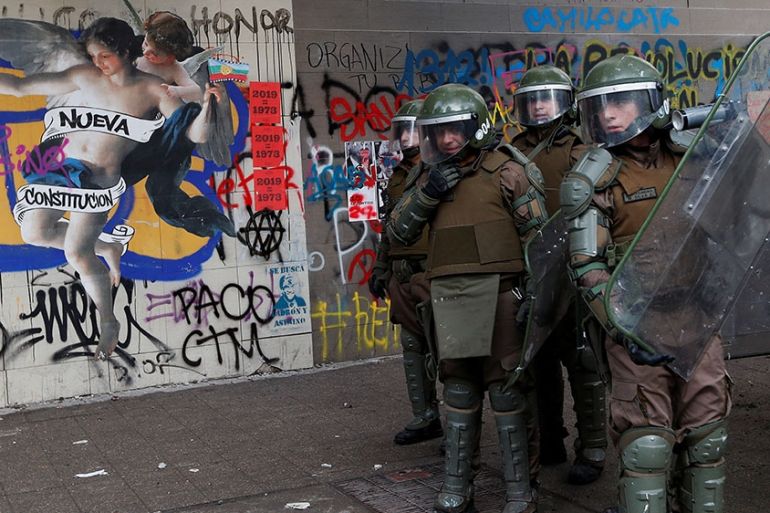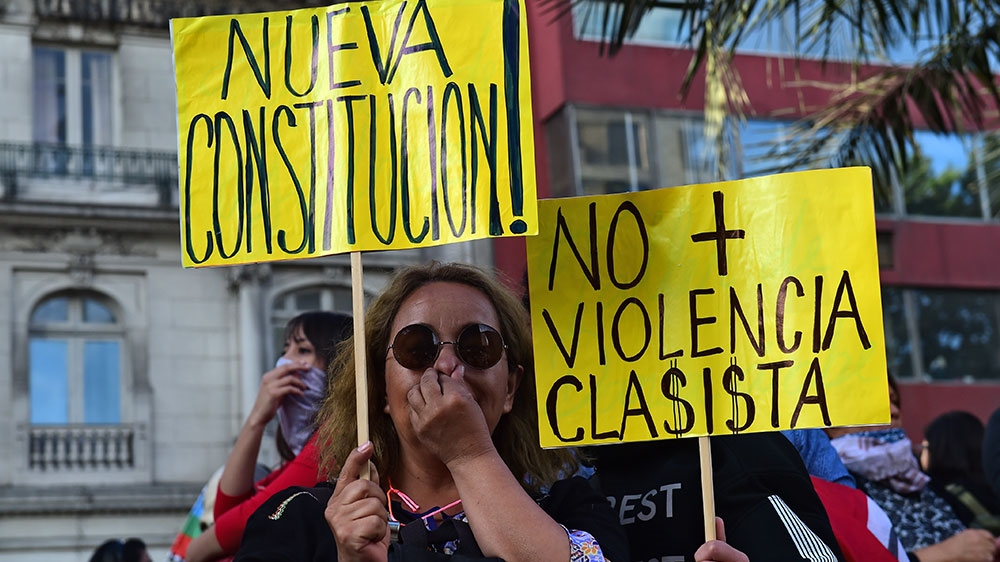Chile: Protesters reject government plan to rewrite constitution
Many protesters say any new constitution must include the input of the public through a constitutional assembly.

Santiago, Chile – Protesters in Chile expressed scepticism on Monday over the government’s announcement it would take steps to change the country’s dictatorship-era constitution.
Interior Minister Gonzalo Blumel announced late on Sunday that the government would move to draw up a new constitution, saying that Congress would be responsible for rewriting the document, which would then be put to a public referendum.
Keep reading
list of 3 itemsChile protests: Chileans demand new constitution amid unrest
Counting the cost of neoliberalism in Chile
The move was apparently aimed at appeasing protesters who have held daily rallies for more than three weeks over growing inequality and alleged rights abuses.
But the announcement was seen as too little, too late by many, who demand the public have a role in the drafting of any new constitution.
“It is only a strategy to calm the protests and return to a false normality,” said Yerko Salvador, a busker who has been protesting daily with his family since the demonstrations began.
“This government will do superficial changes to the constitution, I don’t think they are looking for a new constitution. The whole political class benefits from the constitution of the 80s,” he told Al Jazeera. “But we can’t go on with a constitution made in the dictatorship.”
Central demand
A new constitution has been a central demand of protesters, who see the political and social inequalities as a result of the economic model built by Augusto Pinochet, the dictator who ruled Chile from 1973 to 1990.
This constitution, which Chile still has today, created the legal basis for a market-driven economic model that privatised pensions, healthcare and education.

The document has been amended several times since it was enacted in 1980. But those calling for change say any new text must add further protection of social rights and increase citizen participation in the 30-year-old democracy. Opponents of the overhaul say the current charter has been a pillar of the country’s economic and political stability.
Recent polls in Chile show that support for a new constitution has risen to 87 percent, while President Sebastian Pinera’s approval rating has dropped below 15 percent.
Blumel said a process of “dialogue and conversations will be initiated with all sectors and social and political forces to achieve the broadest agreements”, but did not indicate a deadline.
‘Constitutional Assembly or nothing’
Some protesters say the fact that Congress will be leading the institutional changes shows the government is still not listening to their demands.
After Sunday’s announcement, the hashtag “Constitutional Assembly or nothing” trended on Twitter.
A constitutional assembly, protesters say, would include direct involvement from the people.
In a statement, the opposition Community Party warned citizens would not “validate a constitution emanating from Congress”, as the government has suggested.
“The people have expressed themselves in the streets demanding the end of the 1980 Constitution, an illegitimate text and source of the concentration of economic power and abuse,” the opposition party said. “What citizens demand is a New Constitution created in a broadly democratic and participatory process. That path is the constitutional assembly.”

The Association of Municipalities in Chile released a statement, calling for a referendum in December to let Chileans decide how the Constitution should be adapted.
Meanwhile, protests continued on Monday, with hundreds of teachers marching down the Alameda, the main street towards the presidential palace, in a national strike calling for better education.
More than 20 people have been killed in the unrest, now in its fourth week. Police have been accused of using excessive force against protesters. Businesses and the country’s transport system have also suffered billions of dollars worth of damages from looting, vandalism and arson.
One protester, who asked not to be named, was suspicious of the timing of the government’s announcement, highlighting that the Inter-American Commission on Human Rights was due to meet in Quito, Ecuador, on Monday to discuss the human rights situation in Chile.
“We don’t trust it. It’s strange that exactly yesterday the government announced all this, and today is taking place the meeting in Quito, and civil society and academics will denounce what’s going on,” he said.